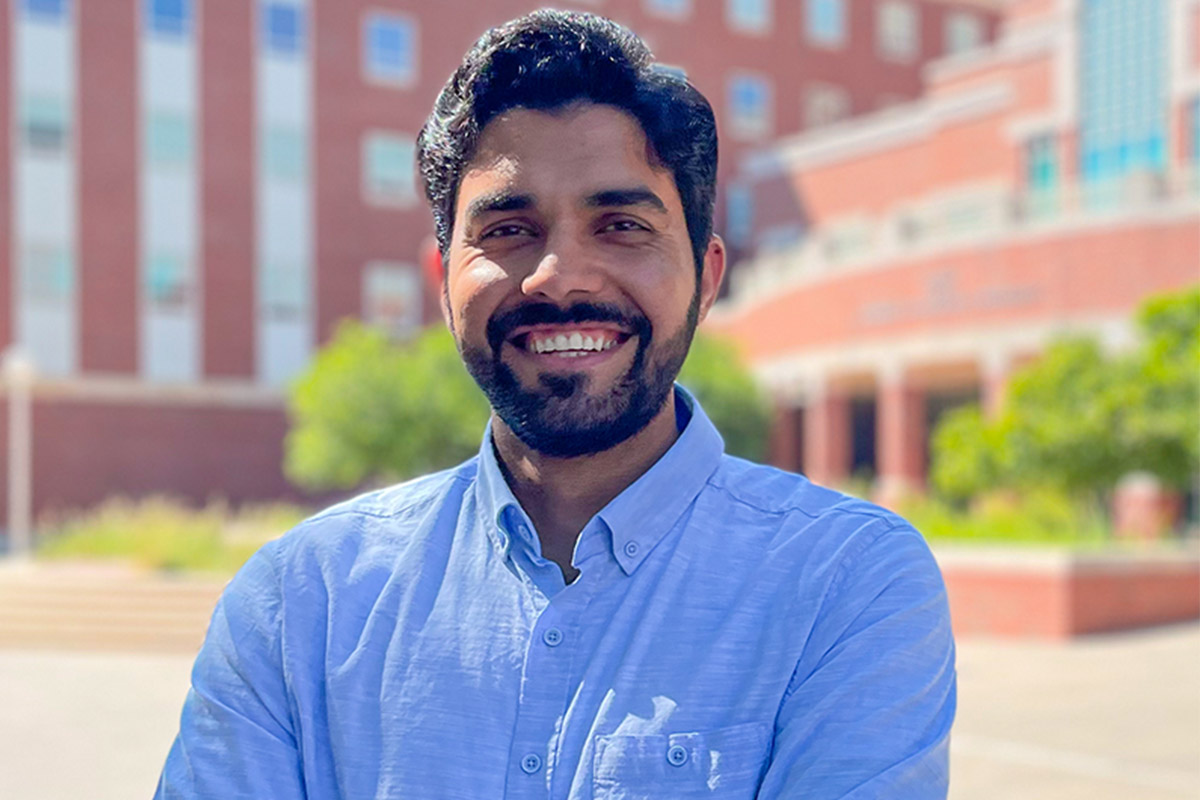Student Feature Friday with Hamid Ikram
Wednesday, August 23, 2023
Hamid Ikram, a second-year student with an unwavering passion for thermal energy systems, is on a quest to redefine the way air-source heat pump systems operate, potentially revolutionizing the heating and cooling industry. In an exclusive interview, Hamid shared insights into his academic journey, his groundbreaking research, and his aspirations for the future.
Hamid is currently pursuing his degree and is set to graduate in the fall of 2027. Beyond the confines of textbooks and classrooms, Hamid finds solace in a myriad of pursuits that fuel his creativity and curiosity. From taking part in cricket matches to culinary creations, and the awe-inspiring beauty of exploring new landscapes, Hamid has a variety of interests, and has a keen eye for adventure. Hamid's globetrotting adventures have taken him from the enchanting landscapes of Belfast, where he explored Game of Thrones filming locations, to the scenic beauty of Denver, Colorado, and the vibrant cityscapes of Dallas and Houston, Texas, where he stood in awe at NASA's facility.
What truly sets Hamid apart, however, is his research work in the field of thermal energy systems. He's currently focused on a project aimed at optimizing the performance of air-source heat pumps during winter. The issue at hand is the detrimental impact of frost buildup on heat pump coils, which can severely reduce their efficiency. To combat this, Hamid is developing advanced control strategies for a defrost controller. This innovative device will efficiently manage frost accumulation on the outdoor coil during winter, not only enhancing the efficiency of air-source heat pumps but also mitigating performance degradation during defrost cycles. The model identifies critical variables that can accurately detect frost patterns, offering a more dynamic and efficient approach compared to the conventional time-based controllers currently in use.
When asked about the potential impact of his research on the industry, Hamid emphasizes the significance of dynamic defrost controllers. These controllers would allow room for some of the sensors to fail and the system will still be operable. Compared to current systems in the market, operating on simple time-based variables, the dynamic controller approach would be informed by data from various sensor-measuring factors. It has the potential to revolutionize the industry by significantly improving system performance and, at the forefront of Hamid’s goals, maximize user comfort.
Reflecting on what drew him to this industry, Hamid spoke of his aspirations of making a tangible impact on people's comfort and well-being through engineering innovation. Resonating with his aspirations, Hamid shared his thesis for his master’s program was focused on helping advance the food storage systems used in his father’s company, resulting in his publication, titled, Techno-economic evaluation of a solar PV integrated refrigeration system for a cold storage facility. This paper is about making a better cooling system based on the conventional vapor compression system for banana fruit storage. He used mathematical equations to design it and make it work better. Then, added solar panels to it and checked if it's a good idea economically and practically. It concludes that by using solar power, one could reduce the energy used and save money in the long run. This idea could also work for other cold storage places with similar refrigeration systems, but more research is needed for the broader applications (Ikram et al., 2021).
Looking to the future, Hamid envisions himself tackling broader energy challenges with a focus on human comfort, efficiency, adaptability, and security. His passion for creating innovative and efficient solutions has been a driving force in his academic and research endeavors.
As for his plans after graduation, Hamid has his sights set on joining one of the U.S. national laboratories, particularly the prestigious Oak Ridge National Laboratory, where he hopes to continue his research and make lasting contributions to the field of thermal energy systems.
Hamid Ikram's journey from a second-year student to an aspiring industry innovator is a testament to the transformative power of dedication, passion, and cutting-edge research. As he continues to find innovative ways to push the boundaries of thermal energy systems, the future of heating and cooling looks promising, and users can look forward to enhanced comfort and efficiency in their everyday lives.
References:
Ikram, H., Javed, A., Mehmood, M., Shah, M., Ali, M., & Waqas, A. (2021). Techno-economic evaluation of a solar PV integrated refrigeration system for a cold storage facility. Sustainable Energy Technologies and Assessments, 44, 101063. https://doi.org/10.1016/j.seta.2021.101063

